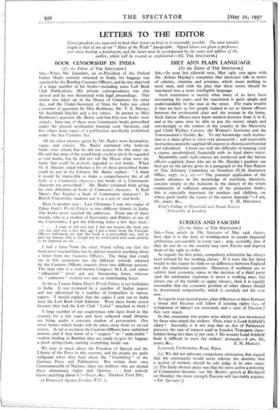STRIKES AND FASCISM [To the Editor of THE SPECTATOR.]
SIR,—Your article in The Spectator of May 14th claims, first, that it is the duty of working-men to accept impartial arbitration, presumably in every case ; and, secondly, that if they do not do so the country may turn Fascist and deprive them of the right to strike.
As regards the first point, compulsory arbitration has always been refused by the working classes. If it were the law there would in this matter be little or no difference between England and the totalitarian countries. Moreover, if workmen are to submit their economic status to the decision of a third party (and the arbination chairman is never a working man, but always one of the middle or upper classes), then it is equally reasonable that the economic position of other classes should be determined compulsorily, which is certainly not the case now.
As regards your second point, what difference is there between a threat that Fascism will follow if existing rights (i.e., of withdrawal of labour) are exercised, and a state of Fascism ? Not very much.
In this connexion two points arise which are not mentioned by those who attack the strikers. First, what is Lord Ashfield's salary ? Secondly, is it not true that an Act of Parliament prevents the rate of interest paid to London Transport share- holders being less than 51 per cent. ? No wonder Lord Ashfield finds it difficult to meet the strikers' demands.—I am, Sir,
yours, &c., E. N. MOZLEY. Lynwood, Clotherholme Road, Ripon.
Kr) We did not advocate compulsory arbitration, but argued that the community would never tolerate the doctrine that a section of workers should be sole judge in its own cause. (2) The fairly obvious point was that the more active a minority of Communists becomes (see Mr. Bevin's speech at Blackpool on Monday) the more strength Fascism will inevitably acquire. —ED. Spectator.]














































 Previous page
Previous page